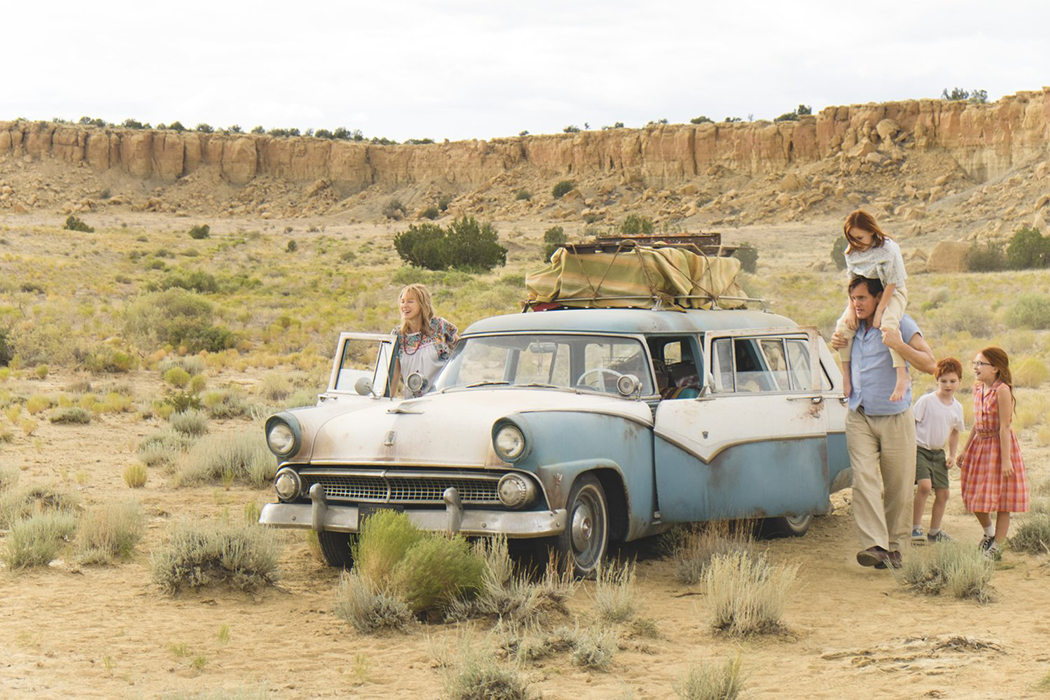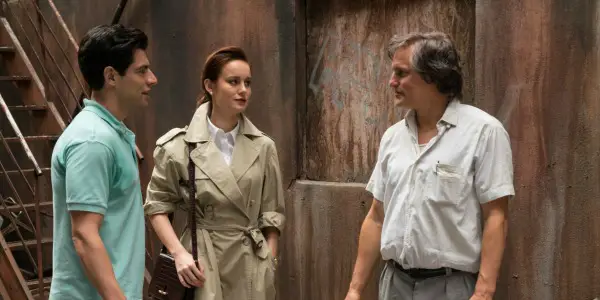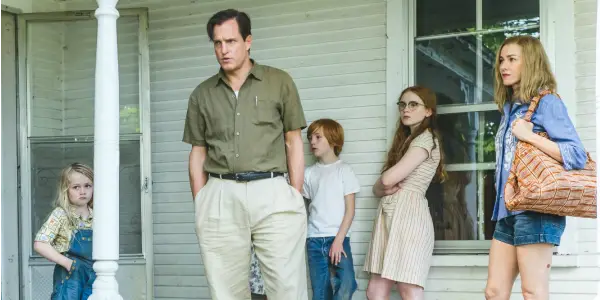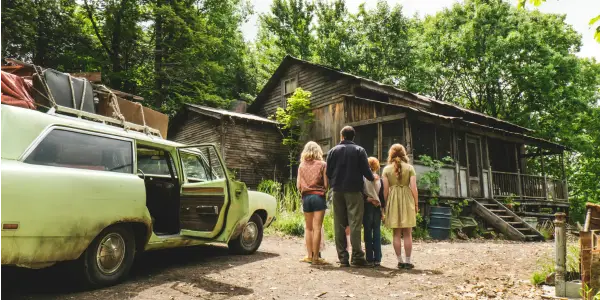THE GLASS CASTLE: Tidiness Undermines Impact

Alex is a film addict, TV aficionado, and book lover.…
Jeannette Walls has quite the story to tell. Her childhood was troubling and exciting, a ramshackle collection of events that should either break someone or hew them into something extraordinary. As a columnist, she recognized the opportunity and reconciled her feelings into an affecting memoir, one that spent seven years on the New York Times bestseller list.
Still, troubled childhoods are depressingly commonplace, and it was Walls’ eye for the positive that made her book stand out. Her father in particular was a mess of contradictions, a man that was either a buoy or a weight dependent on his mood and amount of alcohol consumed.
Through events spanning most of her childhood and into her twenties, Walls’ captured the myriad of emotions that came with growing up in her family, the complexity of which makes the adaptation fraught with wrong turns and miscalculations. As it turns out, lots of poor decisions were made in producing The Glass Castle, and some were too fundamental to recover from.
Where’s The Wild Streak
As with any adaptation, success isn’t about putting every detail of the book onscreen. It’s more about capturing the main themes, and Walls’ memoir was all about the chaos that permeated her life with her father. The movie, unfortunately, does the opposite of what it needs to. Moments from the book are captured in great detail, but the narrative structure is too neat to convey chaos.

Instead of following a linear timeline, the movie jumps between Brie Larson‘s twenty-something Walls and a succession of child actors (mainly Ella Anderson) portraying Walls as she grew up. This isn’t an inherently poor way to handle the film’s extended timeline, but considering how cleanly director Destin Daniel Cretton handles the transitions and how many motifs he and co-writer Andrew Lanham work in to make everything feel cohesive, the less effective this method is for the story being told. Yes, it’s great that the through line is strong, but because it makes emotional developments and the eventual resolution feels inevitable, the story ends up being far too safe.
The Glass Castle is an odd case where an early poor decision was executed very well, and the strong execution actually highlights how misjudged that initial decision was. This is not a story that should feel clean. The audience should be running with Walls, sometimes towards and sometimes away from her family, but most definitely not on a clear path.
Portraying Trauma
There are delicate matters to attend to in The Glass Castle, as the film goes to some dark places in terms of neglect and substance abuse. That’s one of the reasons why Cretton seemed like a great choice to helm the project, because his previous film, Short Term 12, affectingly handled traumatic experiences without feeling exploitative or manipulative. But his approach to these elements are remarkably different here, and again, his choices lessen the impact.

Where Short Term 12 dealt with abuse through veiled conversations and emotional outbursts, The Glass Castle is pretty explicit about what goes down, but it also pulls away from the emotional ramifications. Part of that is its glossy, too tidy veneer. The soft lighting and bright colors, particularly in Larson’s section, give the events a staged feel, which is pretty much the antithesis of the character study it’s trying to be.
In fact, some events end up being confusing, not because it’s unclear what has happened, but because it’s unclear how this affects the characters’ relationships. Not enough time is given to emotional fallouts, and that swift, clean way the film has of moving from event to event comes across as oddly sanitizing. As an audience, you know that you just saw something troubling, but you often don’t really feel it.
Making It Watchable
Even with all these miscalculations, The Glass Castle has plenty of surface pleasures that make it hard to completely dismiss. Cretton and cinematographer Brett Pawlak shoot the film beautifully, combining handheld camerawork with some strikingly staged moments that are efficiently evocative. Larson bursting onto the streets of New York as the camera zooms in gets at the propulsion of the moment, and all the supporting set designs, which varies from a rustic shack to a swanky ’80s apartment, are immaculately done.

Key to any attempted character piece, though, is the casting, which was impressively done here. Thankfully, everyone delivers at the high level you expect, and that does a fair amount to right the film’s wrongs. Naomi Watts is content to take a backseat as the less volatile parent, but she makes sure the character is never forgotten. And Cretton, who coaxed great performances out of a young cast in Short Term 12, gets dynamite work out of Anderson. She never plays too much towards the camera as young Jeannette, instead going toe-to-toe with Woody Harrelson without getting overshadowed.
If anything, though, this is Harrelson’s movie, and there’s few other actors who could pull off this lovably deplorable man. His meatiest stuff comes opposite Larson, and seeing these two clash make it tempting to recommend the film. They both give their characters a subtlety that feels lacking in the rest of the movie, but in the end, even they can’t make their poorly constructed character arcs work.
The Glass Castle: Conclusion
A best-selling book, a promising director, and a great cast made The Glass Castle seem like a tantalizing project, but the pitfalls proved too numerous for this tricky adaptation. There’s certainly things to admire here, but stylistic and structural choices ultimately lead to its downfall. It’s a film that tried to capture an intricate father-daughter relationship, but authenticity was fatally left at the door.
Had you read The Glass Castle? Do you think the story is more suited for a film or a book?
The Glass Castle was released in the U.S. on August 11th. It will be released in the U.K. on October 6th, 2017. For further release dates, click here.
Does content like this matter to you?
Become a Member and support film journalism. Unlock access to all of Film Inquiry`s great articles. Join a community of like-minded readers who are passionate about cinema - get access to our private members Network, give back to independent filmmakers, and more.
Alex is a film addict, TV aficionado, and book lover. He's perfecting his cat dad energy.













